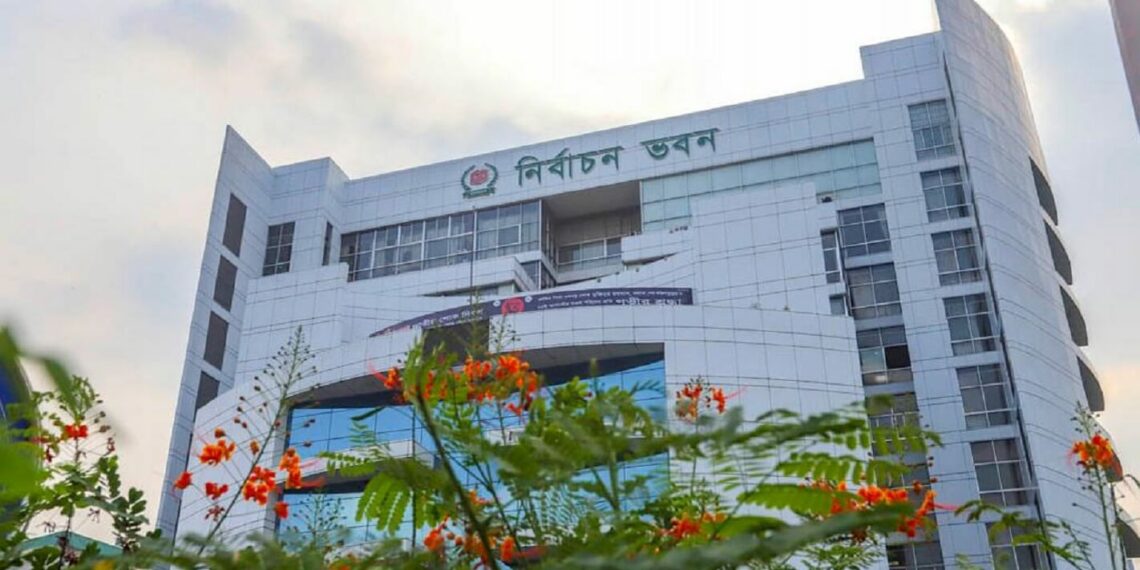Much like the Shakespearean one-liner “there’s something rotten in the state of Denmark”, the Bangladesh Election Commission (BEC) is in the throes of an awful moment which has caused a schism in the five-member panel whose main responsibility now is to shepherd the country through a controversial and mine-laden electoral process.
While recent reports suggest that an issue surrounding the proposed decision to deregister the Bangladesh Nationalist Party (BNP) was at the centre of explosive and angry exchanges between Chief Election Commissioner (CEC) Kazi Habibul Awal and Election Commissioner Anisur Rahman, another controversial matter involving a “strong” letter from the Dhaka-based representative of the European Union pitted the two officials against each other in early November.
According to well placed BEC sources, “two or three controversial issues” have caused “deep misunderstanding” and “tension” among the five election commissioners. Besides Awal and Rahman, the other poll panel members are Brigadier General Ahsan Habib Khan (retd), Rashida Sultana and Mohammad Alamgir who was previously secretary to the BEC a few years ago.
Two days before the full BEC, led by Awal, met Bangladesh President Mohammad Shahabuddin at the latter’s Bangabhaban office-cum-residence on November 9, the chiefs of the Directorate General of Forces Intelligence (DGFI), National Security Intelligence and Special Branch met Awal separately to “pacify” him to not quit his job.
The DGFI, NSI and SB are headed by Major General Hamidul Haque, Major General T M Jobair and Manirul Islam, respectively. All three are said to have been handpicked by Prime Minister Sheikh Hasina.
BEC sources said that on November 7, Awal went ballistic when Rahman brought up the controversial issue of a proposed decision to deregister the BNP, whose top leadership is now in jail for their alleged connection to the violent events of October 28, as a political party.
When an altercation ensued between Awal and Rahman, the latter is said to have torn to pieces some documents related to the proposed deregistration of the BNP. On his part, Awal, shouted at Rahman, calling his colleague a “beyadab” (ill-mannered) and threatened to quit as CEC. Awal’s contention was that any proposal to act against the BNP should have solid legal backing and justification that should be sanctified by court orders.
Their tempers cooled but not before Haque, Jobair and Islam intervened. The three chiefs met Awal and Rahman separately to not act in ways that could precipitate the crisis beyond a point that could potentially threaten to derail the electoral process at a time when pressure from the United States, in the form of likely punitive measures against the BEC, loomed large.
Indeed, BEC and other well-placed bureaucratic sources said that the DGFI, NSI and SB chiefs were under express instructions to “defuse the tension” in the BEC before the return of Sheikh Hasina from her Saudi Arabia tour which was between November 6 and 8.
BEC sources said that the tension within the poll panel “had been building up” for quite some time and began to worsen since October 28 when widespread violence erupted in Dhaka following the unleashed by the police and Awami League supporters on the cadres and workers of the BNP.
Besides the BNP, hundreds of thousands of supporters of the Jamaat-e-Islami and the Awami League had assembled in central Dhaka in a show of strength. The BNP’s stand is that elections to the 12th Jatiya Sangshad cannot be held under the stewardship of the ruling Awami League.
In the litany of confrontations between Awal and Rahman, senior-level BEC sources revealed, was “some katha kata-kati (altercation)” over a “sensitive missive sent to the BEC by the Dhaka-based European Union ambassador Charles Whiteley”.
The sources, however, did not disclose the contents of the letter, saying only that “it was considered sensitive enough to tick off Awal and Rahman”. They added that there a few other controversial issues “have caused to gradually widen the split in the poll panel”.
Other sources said that at the heart of the confrontations and clashes within the BEC is the bureaucratic backgrounds of the officers. While Ahsan Habib Khan is a one-star general, two election commissioners, Awal and Sultana are from the bureaucracy’s judicial cadre. On the other hand, Rahman and Alamgir draw their clout from being officers of the administration cadre which is considered to be superior in the bureaucratic hierarchy.
“A perennial tension prevails among officers from the judicial and administration cadres,” agreed Nazmul Ahsan Kalimullah, a professor and head of JANIPOP which has been observing elections in Bangladesh for a while.
Top BEC sources admitted that even as frequent bickerings, differences of opinion, crossing of swords and skirmishes among the poll panel members have bogged down work and rent the air at the commission’s Agargaon headquarters, a contributory factor behind the delay in announcing the all-important tafseel or election notification was due to the time being taken to fix technical glitches in the Smart Election app.
“The app was inaugurated internally at the BEC on November 12 and will likely be officially launched in a couple of days,” a senior poll panel source said, adding that the commission was also taking into account a few of the prime minister’s engagements involving inauguration of some development projects before the declaration of the tafseel.
The sources said that even as “all preparations are underway”, the printing of ballot papers will be taken up sometime in December when BEC will be in a position to gather all details related to party symbols. “There is a relationship between the tafseel issuance and the party symbols,” the source said, adding that the “BEC is now in a position from where there is no turning back”.















